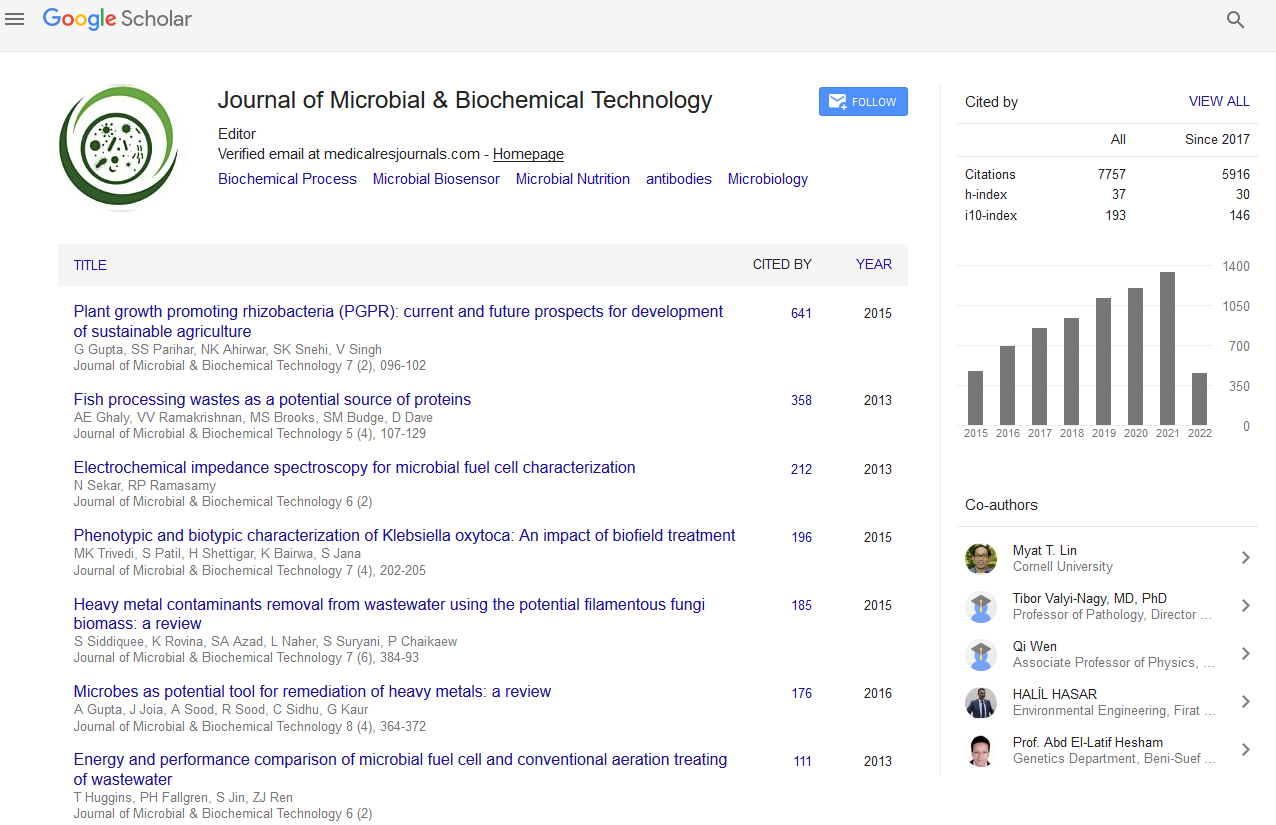PMC/PubMed Indexed Articles
Indexed In
- Academic Journals Database
- Genamics JournalSeek
- Academic Keys
- JournalTOCs
- China National Knowledge Infrastructure (CNKI)
- Scimago
- Access to Global Online Research in Agriculture (AGORA)
- Electronic Journals Library
- RefSeek
- Directory of Research Journal Indexing (DRJI)
- Hamdard University
- EBSCO A-Z
- OCLC- WorldCat
- SWB online catalog
- Virtual Library of Biology (vifabio)
- Publons
- MIAR
- University Grants Commission
- Geneva Foundation for Medical Education and Research
- Euro Pub
- Google Scholar
Useful Links
Share This Page
Journal Flyer

Open Access Journals
- Agri and Aquaculture
- Biochemistry
- Bioinformatics & Systems Biology
- Business & Management
- Chemistry
- Clinical Sciences
- Engineering
- Food & Nutrition
- General Science
- Genetics & Molecular Biology
- Immunology & Microbiology
- Medical Sciences
- Neuroscience & Psychology
- Nursing & Health Care
- Pharmaceutical Sciences
Antimicrobial activity of clove oil against microbes isolated from water
International Conference and Expo on Water Microbiology & Novel Technologies
July 18-19, 2016 Chicago, USA
Prati Pal Singh and Daljit Kaur
National Institute of Pharmaceutical Education and Research, India
Posters & Accepted Abstracts: J Microb Biochem Technol
Abstract:
We studied the antimicrobial activity of clove oil against drug-resistant bacteria in water collected from nearby regions. The bacteria were identified and assessed of antimicrobial resistance by using BD Pheonix 100 automated microbiology system. Klebsiella pneumoniae, Enterobacter cloacae, Klebsiella oxytoca, Acinetobacter lwoffii/haemolyticus, Escherichia coli, Arcanobacterium haemolyticum, Bacillus cereus, Pediococcus pentosaceus, Gardnerella vaginalis, Macrococcus caseolyticus, Dermacoccus nishinomiyaensis, Staphylococcus cohnii, Staphylococcus gallinarum, Bacillus megaterium, Streptococcus anginosus and Streptococcus porcinus were isolated. Almost all the Gram-negative isolates were resistant to cefazolin, cephalexin, cefoxitin, cefotaxime, ampicillin, amoxicillinclavulanate, trimethoprim-sulfamethoxazole, nalidixic acid and tetracyclin and nitrofurantoin. On the other hand, the Grampositive isolates showed tolerance to cefoxitin, ampicillin, penicillin G, oxacillin, amoxicillin-clavulanate, teicoplanin, quinupristindalfopristin, vancomycin, clindamycin, erythromycin, ciprofloxacin, rifampin and tetracyclin. The Gram-negative bacteria showed highest resistant to ampicillin (76%), cefazolin (64%), cephalexin (52%) and nalidixic acid (40%), respectively. Similarly, up to 80% Gram-positive isolates were resistant to clindamycin and 60% to cefoxitin, ampicillin, penicillin G and erythromycin. The antibacterial activity of clove oil was tested in 5% aqueous DMSO and worked well in the order 1:1>1:5>1:10>1:20. The multiple drug-resistant Enterobacter cloacae isolate was relatively more sensitive (inhibition zone diameter (IZD): 19 mm) to clove oil than Escherichia coli (IZD 18 mm). For Staphylococcus sciuri, Klebsiella pneumonia and Staphylococcus gallinarum the IZDs were 14.5 mm, 13.5 mm and 11 mm, respectively. Clove oil appeared to have some significant antimicrobial activity which can be used for therapeutic purposes.
Biography :
Email: drppsingh2005@gmail.com


